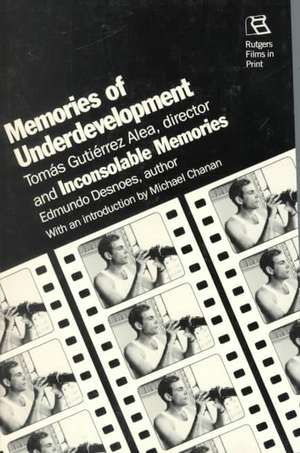Memories Of Underdevelopment: Rutgers Films in Print series
Autor Michael Chananen Limba Engleză Paperback – iun 1990
Memories of Underdevelopment was the first great international success of Cuban cinema. The film provides a complex portrait of Sergio, a disaffected bourgeois intellectual who remains in Havana after the Revolution, suspended between two worlds. He can no longer accept the values of his family's reactionary past and yet boredom and the conditioning of his early life prevent him from committing himself to the new revolutionary society. Sergio's story is played out in the turbulent period of the Bay of Pigs invasion and the 1962 missile crisis, events he can only watch on his television screen or from his apartment balcony.The film, initially banned by the U.S. government as part of its trade quarantine of Cuba, was shown here five years after its original release. But American critics responded enthusiastically to it and the National Society of Film Critics bestowed an award on its director.
This double volume includes the complete continuity script of Memories, as well as the complete novel, Inconsolable Memories, upon which the film is based. An interview with Alea is reproduced here, as well as documentation of the political controversy that surrounded the film in this country. Michael Chanan's introduction places the film in the context of Cuban political and cultural history. The volume also includes a biographical sketch of Alea, a chronology of the Cuban Revolution, reviews, commentary, a filmography, and a bibliography.Michael Chanan lives in England, where he teaches and writes on film. He is the author of The Cuban Image: Cinema and Cultural Politics in Cuba.
This double volume includes the complete continuity script of Memories, as well as the complete novel, Inconsolable Memories, upon which the film is based. An interview with Alea is reproduced here, as well as documentation of the political controversy that surrounded the film in this country. Michael Chanan's introduction places the film in the context of Cuban political and cultural history. The volume also includes a biographical sketch of Alea, a chronology of the Cuban Revolution, reviews, commentary, a filmography, and a bibliography.Michael Chanan lives in England, where he teaches and writes on film. He is the author of The Cuban Image: Cinema and Cultural Politics in Cuba.
Preț: 311.36 lei
Nou
Puncte Express: 467
Preț estimativ în valută:
59.58€ • 63.71$ • 49.68£
59.58€ • 63.71$ • 49.68£
Carte tipărită la comandă
Livrare economică 17 aprilie-01 mai
Preluare comenzi: 021 569.72.76
Specificații
ISBN-13: 9780813515373
ISBN-10: 0813515378
Pagini: 274
Ilustrații: 1
Dimensiuni: 152 x 229 x 20 mm
Greutate: 0.45 kg
Ediția:None
Editura: Rutgers University Press
Colecția Rutgers University Press
Seria Rutgers Films in Print series
ISBN-10: 0813515378
Pagini: 274
Ilustrații: 1
Dimensiuni: 152 x 229 x 20 mm
Greutate: 0.45 kg
Ediția:None
Editura: Rutgers University Press
Colecția Rutgers University Press
Seria Rutgers Films in Print series
Notă biografică
Michael Chanan lives in England, where he teaches and writes on film. He is the author of The Cuban Image: Cinema and Cultural Politics in Cuba.
Cuprins
Introduction -
Lessons of Experience
Tomas Gutierrez Alea: A Biographical Sketch
Chronology
Memories of Underdevelopment -
Credits and cast
The Continuity Script
Notes on the Continuity Script
Contexts -
Source :
Inconsolable Memories
Aftermath: Politics and Cinema :
Federal Agents Seize Cuban Festival Films Here
Film Critics' Letter
U.S. Refuses Visa to Cuban Director to get Film Award
Editorial: Celluloid Menace
Telegram from Tomas Gutierrez
Personal Recollections of T.G. Alea :
Individual Fulfillment and Collective Achievement: An Interview with Tomas Gutierrez Alea
Memories of Memories
Reviews and Commentaries -
Reviews:
New York Times
The New Republic
The New Yorkers
Sight and Sound [London]
Cinema 74 [Paris]
Cinema & Film [Rome]
Commentaries:
A Dialectal and Partisan Film
Memories of Underdevelopment in the Land of Overdevelopment
"Witnesses Almost Everywhere": The Rhetorical Strategies of Memories of Underdevelopment
Filmography and Bibliography -
Alea Filmography, 1950-1988
Selected Bibliography
Lessons of Experience
Tomas Gutierrez Alea: A Biographical Sketch
Chronology
Memories of Underdevelopment -
Credits and cast
The Continuity Script
Notes on the Continuity Script
Contexts -
Source :
Inconsolable Memories
Aftermath: Politics and Cinema :
Federal Agents Seize Cuban Festival Films Here
Film Critics' Letter
U.S. Refuses Visa to Cuban Director to get Film Award
Editorial: Celluloid Menace
Telegram from Tomas Gutierrez
Personal Recollections of T.G. Alea :
Individual Fulfillment and Collective Achievement: An Interview with Tomas Gutierrez Alea
Memories of Memories
Reviews and Commentaries -
Reviews:
New York Times
The New Republic
The New Yorkers
Sight and Sound [London]
Cinema 74 [Paris]
Cinema & Film [Rome]
Commentaries:
A Dialectal and Partisan Film
Memories of Underdevelopment in the Land of Overdevelopment
"Witnesses Almost Everywhere": The Rhetorical Strategies of Memories of Underdevelopment
Filmography and Bibliography -
Alea Filmography, 1950-1988
Selected Bibliography
Recenzii
Here is a film that is wise, sad, and often funny... effective and moving... complete in the way very few ever are.
Descriere
Memories of Underdevelopment was the first great international success of Cuban cinema. The film provides a complex portrait of Sergio, a disaffected bourgeois intellectual who remains in Havana after the Revolution, suspended between two worlds. He can no longer accept the values of his family's reactionary past and yet boredom and the conditioning of his early life prevent him from committing himself to the new revolutionary society. Sergio's story is played out in the turbulent period of the Bay of Pigs invasion and the 1962 missile crisis, events he can only watch on his television screen or from his apartment balcony.The film, initially banned by the U.S. government as part of its trade quarantine of Cuba, was shown here five years after its original release. But American critics responded enthusiastically to it and the National Society of Film Critics bestowed an award on its director.

























